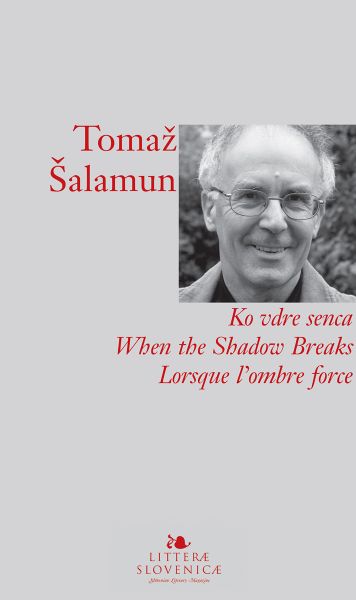Ko vdre senca / When the Shadow Breaks / Lorsque l'ombre force
Tomaž Šalamun confronts the abyss and overcomes it by creating an even deeper abyss in an incredibly physical language that swallows the original. This new metamorphosed abyss is, then, more like a well, nurturing even as it brings forth its water from the mysterious depths of language. Of course other influences are drawn from that well — Vallejo, Breton, Khlebnikov, Hikmet, O'Hara. The result is a language of non-sequiturs, contradictions, literalized figures of speech, hyperbolic claims, episodic fragments, intense confessions, false causalities, askew parallelisms, — all enhancing the poetry's juxtapositions of the cosmic and the trivial, redefining each in terms of the other. As poet Trenna Sharpe says, “I love Tomas Šalamun's poems for their roaring and zany associative movements. One can't help but feeling a little bit out of breath, a little in shock, after finishing one. It's as if the the poem knocks you down a hill: you tumble down getting all twisted and bounced and disoriented, and at the end you stand up dizzy and out of breath, but when you look back, the grass is bent, a branch is broken, maybe your sock fell off somewhere along the way, and you can figure out just how you got to the bottom”. This is a poetry that fulfills English poet W. H. Auden's definition as a remaking of the language, and more,
For Šalamun, the poem must always be engaged in a quest for what it cannot say in traditional terms: “The poet is a hunter, not an expresser”, he says in an interview. “You express what you already have. The inexpressible is like the beast in the woods that the hunter always knows only by its tracks. The very fact that we can't describe it adequately now, searching as we are with various metaphors and similes, shows what a powerful thing it is, what attraction it has”. And yet another paradox emerges: the hunter not only destroys the prey, but also himself (www.litteraeslovenicae.si).
Tomaž Šalamun is considered to be one of the fathers of the Slovenian avant-garde and modernist poetry. In the 1970s, when he was a member of the avant-garde group OHO, at the Zagreb exhibition Great-great-grandfathers, he “drew a line” and discovered art as a relationship between “can and cannot”, and, at the same time, as a field spreading from the topos of art galleries to the world and human life as a whole. He received many national and international awards for poetry (Prešeren Prize, Jenko Award, the European Prize for Poetry from the city of Münster, a Fulbright scholarship etc.) and is the most translated Slovenian poet. He taught creative writing at two American universities (University of Pittsburgh and University of Massachusetts Amherst, Richmond).
The relationship between “can and cannot” can be seen in Šalamun's shifts in the Slovenian cultural and social space as follows: Šalamun rattled Slovenian poetry in its national and socio-political, internal and external borders, doing so in a manifestly leisurely and playful way; he brought into Slovenian poetry, which was fixated on the concealed crimes of the Second World War, American poetry as a way of seeking something continually new; he brought into his poetry marginal experiences and lifestyles which transgress the patriarcho-tribal tradition. With the principle “I is language” (which, in return, with different modes of speech sometimes shows and sometimes pretends that it has no self), and with lucid humour and various fresh creative concepts, his poetry became key and primary reading for young poets in Slovenia and the former Yugoslavia, regardless of whether they had killed their “father-idol” or kept him alive.
It is difficult to separate Šalamun as a symbolic and almost mythological figure from his poetry. After his first volume of poems, “Poker” (1966), there came more than forty other volumes of poetry. In the final fifteen years of his life, this poetry moved increasingly into correlation with the pre-lingual and language, and further and further away from thoughts/meaning and body, much like the way a laboratory instrument records fluctuations of the brain. Is there, in this recording, a necessity, a constant struggle and attempt for the cessation of this last, existential “you cannot”? Can the field of possibilities continue indefinitely? Is it possible to reach into infinity with the help of language?
Tomaž Šalamun died in 2014 in Ljubljana.
Versandkostenfreie Lieferung! (eBook-Download)
Als Sofort-Download verfügbar
- Artikel-Nr.: SW9789616995290
- Artikelnummer SW9789616995290
-
Autor
Tomaž Šalamun
- Mit Alenka Jovanovski, Barbara Pogačnik, Michael T. Taren, Richard Jackson
- Wasserzeichen ja
- Verlag Slovene Writers' Association
- Seitenzahl 251
- Veröffentlichung 24.07.2017
- Barrierefreiheit
- ISBN 9789616995290
- Mit Alenka Jovanovski, Barbara Pogačnik, Michael T. Taren, Richard Jackson

